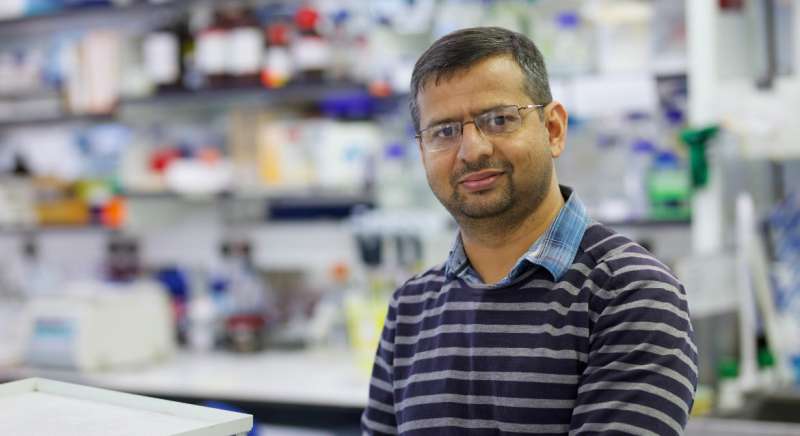Researchers make critical cell division discovery

Researchers at the University of Dundee have solved one of the mysteries of cell division, a discovery which may shed light on cancer development and one day help develop new drugs to treat the disease.
Humans are made of approximately 37 trillion cells, all of which need to be constantly replaced with exact copies when they become old or damaged through an orderly process called cell division, or mitosis. Depending on the location of the cells in specific tissues and organs, the cell division axis determines the correct positioning of the new cells in tissues. When this process goes wrong it can contribute to, and in some cases cause, diseases such as cancer.
Researchers in Dr. Gopal Sapkota's lab in the Medical Research Council Protein Phosphorylation and Ubiquitylation Unit (MRC PPU) at Dundee have identified a new player in the cell division machinery called CK1α, an enzyme which acts to ensure proper, accurate cell division. Furthermore, they have discovered the molecule, known as FAM83D, responsible for coordinating the role of CK1α in cell division.
This is an important step in untangling the complex regulation that takes place to ensure our cells divide properly and accurately. Through identifying new molecules responsible for this, scientists are able to appreciate both how they act in a normal healthy cell, and importantly how their dysregulation might contribute to cell division-associated diseases.
"The incredible journey from a single cell to a functional human is, as you can imagine, immensely complicated and full of many unanswered questions," said Dr. Sapkota. "Whilst the basic components required for healthy cell division are well established, there are many aspects of this vital process that remain unknown."
"If we can understand fully how cell division works, if we can gain some insight into which cell division components are the key players, we can begin to appreciate how this process works in a healthy individual, and perhaps identify vulnerabilities in diseases such as cancer.
"What we have done with this research is demonstrate that the cell division axis is faulty in cells without FAM83D, which dictates the function of CK1α in cell division, and this results in delayed and inaccurate cell division. The correct division axis control is vital for both the development of a human being, and maintaining its healthy tissues and organs once it has developed.
"In certain cancers, FAM83D has been reported to be amplified, suggesting such cancer cells could be vulnerable to its loss. As a result of our discovery, future research will aim to address whether disruption of the FAM83D-dependent CK1α activity in cell division is a promising therapeutic approach for killing cancer cells."
FAM83D directs CK1α to the mitotic spindle—a cellular skeletal structure that acts to pull apart the chromosomes (the home of the DNA) during cell division. Cells that don't possess any spindle-associated CK1α fail to orientate their cell division axis effectively, and take longer to undergo a division.
Cancer, in its simplest terms, is uncontrolled cell division. In a healthy cell, the decision when to divide is a very tightly governed process. However, if a cell becomes cancerous, it can evade these rules and continuously divide and grow. Such acts of anarchy result in the formation of large clumps of cells, with large energy demands—tumours.
The research was led by Luke Fulcher, a Ph.D. student in Dr. Sapkota's lab and carried out in conjunction with the University of British Columbia, Canada. The findings are published in the latest edition of the journal EMBO Reports.
More information: Luke J Fulcher et al. FAM 83D directs protein kinase CK 1α to the mitotic spindle for proper spindle positioning, EMBO reports (2019). DOI: 10.15252/embr.201847495
Journal information: EMBO Reports
Provided by University of Dundee

















